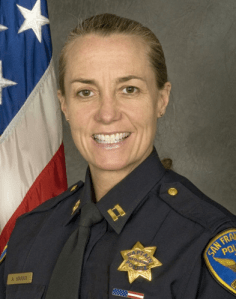SFPD Traffic Company Commander Mikail Ali has been replaced by Northern Station Captain Ann Mannix, the SF Chronicle reported today.
Ali, who held the position for two-and-a half years, has repeatedly promised that the SFPD is committed to its "Focus on the Five" enforcement campaign. But under his tenure, only one station has come close to meeting the target of issuing 50 percent of traffic tickets for the most common causes of pedestrian injuries -- speeding, violating pedestrian right-of-way in a crosswalk, red light running, stop sign running, and turning violations. The share of tickets to people walking and biking, meanwhile, has increased.
In an interview with Streetsblog, Mannix expressed reservations about ordering officers to follow the SFPD's 50 percent goal.
Those five violations are the most common causes of pedestrian crashes, according to SFPD data compiled and reported by the SFMTA. SFPD's "Focus on the Five" campaign is predicated on using that data to deploy traffic enforcement resources most effectively. The campaign was announced two years ago, and Ali set the 50 percent minimum one year ago, but thus far only Richmond Station has met the goal.
When asked if she would help get the department to meet its enforcement targets, Mannix questioned the data and told Streetsblog that "it's a very fine line between issuing a quota to police officers to do something -- they observe a violation and cite it. I cannot, by law, make them go out and issue a citation."
"We will continue to focus on those five. Will they be the highest numbers we cite? Not necessarily."
Walk SF Executive Director Nicole Schneider said she hopes that Mannix "embraces an approach to ensure that SFPD's citations are based on data... for the Police Department to do their part in shifting the culture on San Francisco streets so that a human life is worth more than speed."
But Mannix contended that speed is likely overrepresented in the data collected through the Statewide Integrated Traffic Records System (SWITRS) because under the system, unsafe speed is often marked as a primary factor in crashes when drivers weren't exceeding the speed limit. "If the speed limit's 25, you could be going 10 mph and be going too fast for conditions -- you were speeding," she said. "That would be a primary factor barring any other obvious collision factors."
Rather than increasing the share of "focus on the five" citations, Mannix said the SFPD's "biggest challenge right now is collecting and providing data."
When asked if she'd try to get other SFPD stations to model Richmond Station, which has exceeded the enforcement targets all year, she asked, "Is that the panacea we're looking for? Is that going to resolve issues we have in the city? It's education, engineering, and enforcement... Some districts lend themselves better to capturing the top five violations than others."
Mannix noted that Tenderloin District only has one stop sign, whereas Richmond has hundreds, which will affect the prevalence of stop sign violations and citations. Yet Tenderloin officers issued 43 percent of their tickets to pedestrians in September (the highest share of any station), and none to drivers violating pedestrians' right-of-way.
In 2012, as Northern Station Captain, Mannix told Streetsblog that a couple who was harassed by a driver while biking "may have been following too closely" when the driver reportedly braked suddenly in front of them and caused one to crash. To make her point she cited a vehicle code that only applies to motor vehicle drivers, and also falsely claimed that people on bikes must stay "to the extreme right" of a traffic lane.
As for why Ali was replaced, SFPD Chief Greg Suhr told Chronicle columnist Heather Knight that it had nothing to do with his performance. He said Ali "did a great job overseeing the department’s response to Vision Zero," and touted a slight dip in pedestrian fatalities from 2013 to 2014, from 21 to 17. “What do they say? Numbers don’t lie,” Suhr said. “He did a good job.”
More often than not, Ali's statements to reporters have pointed the finger at victims. Earlier this month, he said many of the deaths were due to "really, really bad behavior" on the part of people killed by drivers, and has previously said some pedestrian crashes may be caused by confused Asian immigrants.
Ali was transferred to a position at SF International Airport, which according to Knight "usually... means they did something wrong and will never be heard from again."
"Over the past year, Chief Suhr and Commander Ali helped bring traffic enforcement to center stage," said Schneider, noting that total traffic citations increased by more than 50 percent from 2013 to 2014, though few of those tickets are going to the "five" violations. "As we head into the new year, we're going to be focusing on the department's goal."






